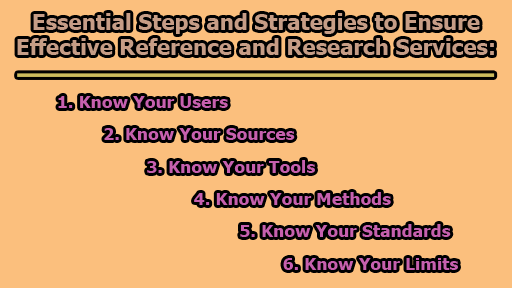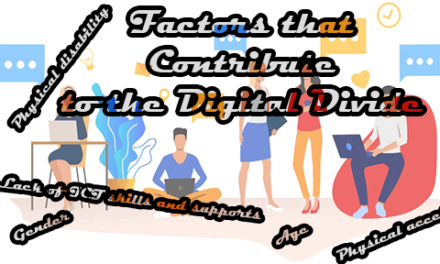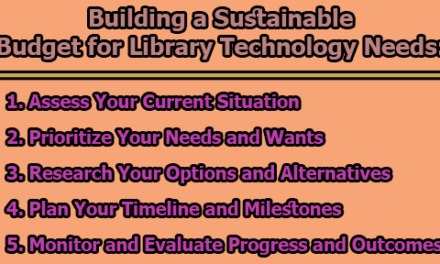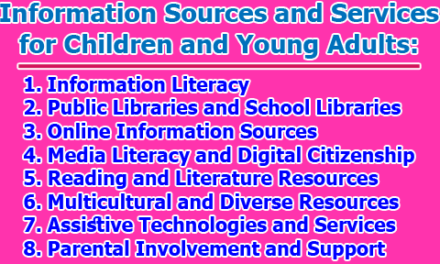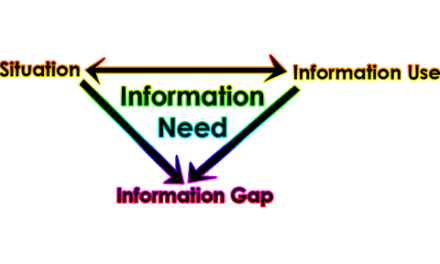Essential Steps and Strategies to Ensure Effective Reference and Research Services:
Reference and research services play a vital role in the library profession, enabling users to access and utilize information effectively for their diverse needs. Whether you work in an academic, public, school, or special library, the ability to conduct efficient reference and research services is a key component of your role. This article explores the essential steps and strategies to ensure effective reference and research services, covering the importance of understanding users, sources, tools, methods, standards, and limits.
1. Know Your Users: Understanding your users is the foundation of providing quality reference and research services. To achieve this, employ various methods such as surveys, interviews, focus groups, observation, feedback, and analytics. Creating user personas, profiles, or scenarios can also help represent different types of users and their information behaviors. This knowledge empowers you to tailor your services to the goals, contexts, and levels of expertise of your users, enhancing their overall experience.
2. Know Your Sources: Library professionals must be familiar with information sources that are relevant, reliable, and accessible to users. This entails understanding different types of sources, including books, journals, databases, websites, archives, and media. Additionally, you should be able to evaluate the quality, credibility, and authority of these sources. Staying updated on trends and developments in your field and being aware of ethical and legal issues related to information use and sharing are equally important.
3. Know Your Tools: Effective reference and research services require the use of various tools and technologies to find, organize, and present information. Familiarize yourself with different search strategies, including keywords, phrases, operators, filters, and facets, to optimize search results. Additionally, understanding tools for managing and citing sources, such as bibliographic software, citation generators, and style guides, is crucial. Communication and collaboration tools like email, chat, video conferencing, social media, and online platforms are essential for engaging with users and colleagues effectively.
4. Know Your Methods: Reference and research services involve not only finding information but also engaging with users, understanding their issues, and helping them resolve their questions or problems. Familiarity with various methods and techniques, such as the reference interview, the research cycle, and information literacy instruction, is essential. The reference interview involves asking open-ended, clarifying, and verifying questions to comprehend user information needs. The research cycle covers defining, locating, selecting, evaluating, synthesizing, and communicating information to answer research questions. Information literacy instruction involves teaching users how to find, evaluate, and use information effectively and ethically.
5. Know Your Standards: Reference and research services are governed by professional standards and guidelines. These standards include codes of ethics, core competencies, and best practices. The code of ethics outlines rules and principles guiding professional conduct, emphasizing values like respect, confidentiality, honesty, and fairness. Core competencies define a professional’s role and responsibilities, emphasizing skills and knowledge in areas such as communication, collaboration, leadership, and innovation. Best practices provide recommendations and examples for effectively performing tasks and services, including assessment, evaluation, and improvement.
6. Know Your Limits: Finally, it is essential to be aware of your limits and boundaries when conducting reference and research services. You should know when to refer users to other sources, services, or experts, when to seek help or advice, and when to conclude a service. Dealing with difficult or challenging situations, such as conflicts, complaints, or ethical dilemmas, requires a clear understanding of your boundaries. Balancing your workload, prioritizing tasks, and managing your time and stress is equally important to ensure sustained effectiveness in your role.
In conclusion, effective reference and research services are integral to the library profession. By understanding your users, sources, tools, methods, standards, and limits, you can provide high-quality services that empower users to access and utilize information for various purposes. A combination of skills, knowledge, and a commitment to ethical conduct will enable you to excel in this essential role, regardless of the type of library in which you work. Ultimately, library professionals who master these aspects are better equipped to meet the diverse information needs of their users and contribute significantly to the dissemination of knowledge and information in our digital age.

Library Lecturer at Nurul Amin Degree College

